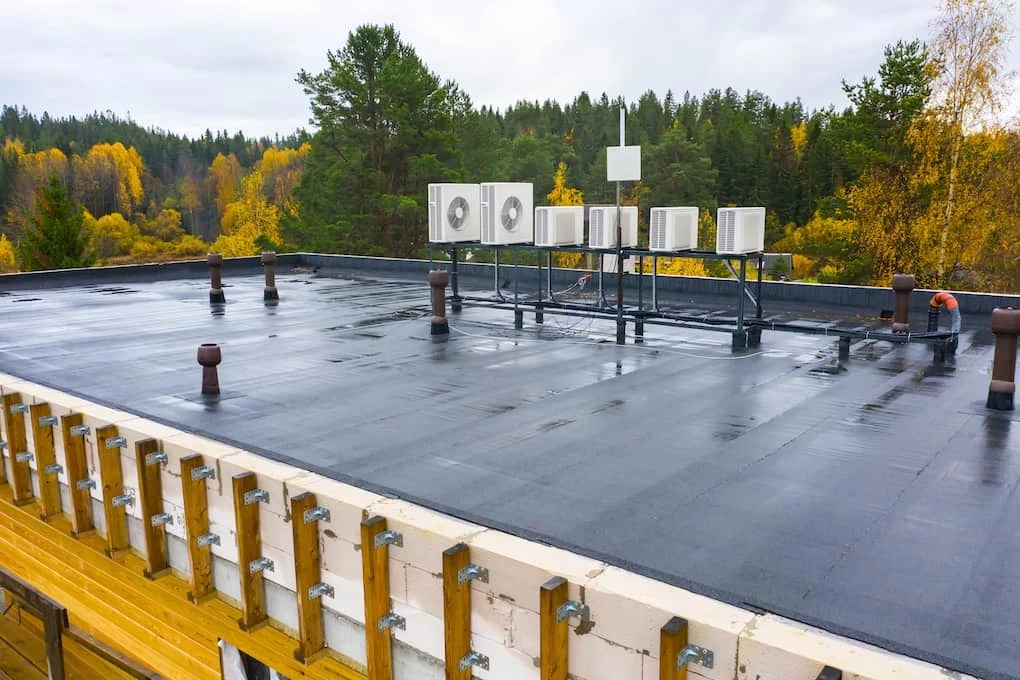As spring rolls around, there is no better time than to start thinking about investing in a new commercial roof. However, finding a durable and long-lasting commercial roof can seem like an overwhelming decision, thanks to the numerous types of commercial roofs available.
Does your building sit underneath trees? Is it an older building? What is your long-term budget for investing and maintaining your commercial roof? These questions will help you narrow down the best choice for your property.
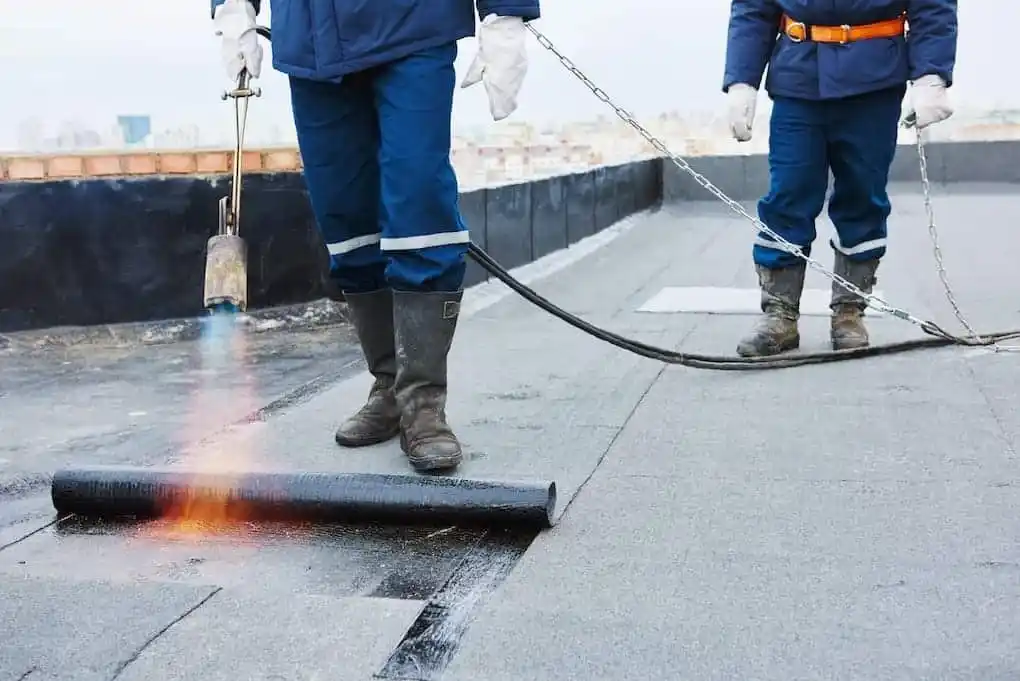
COMMERCIAL ROOFING FACTORS TO CONSIDER
When considering a new roof installation for your commercial building, it’s essential to work with the best materials to create the ideal commercial roofing system. Some of the many factors to consider include:
- Energy efficiency capabilities
- Climate
- Location
- Building Structure
- Fire resistance
- Roofing materials
- Residential roofing or commercial roofing material
- Pitched, low slope, or flat roof structure
Choosing the best commercial roofing for your property can help protect your business and wallet. The last thing that building owners want to worry about is whether or not their commercial roofs will hold up against the elements. For this reason, it’s imperative to use the best commercial roofing material for each project.
SELECTING THE RIGHT DESIGN FOR YOUR COMMERCIAL ROOFS
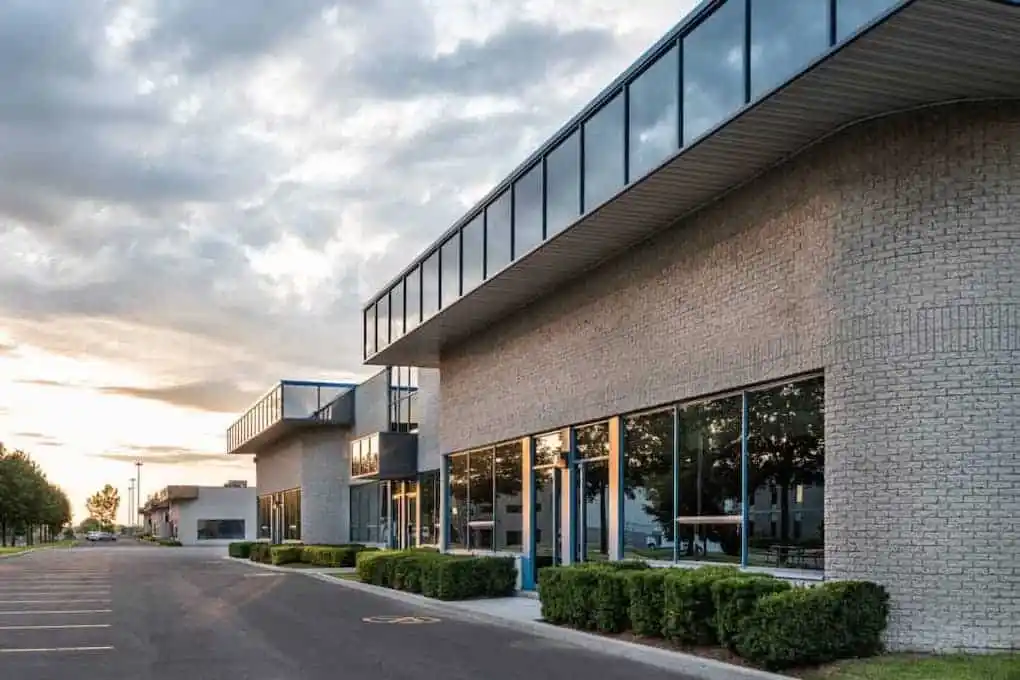
The key to protecting different commercial buildings is to ensure owners invest in the appropriate materials for each project. This is because a thoroughly installed and properly maintained commercial roof can have a significant lifespan. There are several types of commercial roofing that property owners can choose from, such as:
- Retail: restaurants, shopping centers, single-unit retailers
- Office: urban and suburban spaces ranging in size
- Multifamily Units: apartments, condos, co-ops, townhomes
- Industrial: warehouses, cold storage sites, manufacturing buildings
It’s best to start by narrowing down what type of commercial roof is needed based on the function of each business. Then, property owners can work with skilled commercial roofing contractors to find the best commercial roofing materials for the job.
7 TYPES OF COMMERCIAL ROOFS
Since there are many different kinds of commercial properties, it’s clear that each will have its own roofing needs. For example, apartment buildings don’t have commercial flat roofing and therefore need different commercial roofing materials to best fit their pitched roofs. On the other hand, other industrial buildings have either a flat roof or a low roof slope. Since these commercial roofing systems are different, they need specific materials that best protect each building.
The different types of commercial roofing include:
- Metal Roofing
- Vegetative Roofing
- Thermoplastic PVC Roofing
- Shingles
- Built-Up Roofing Membrane
- Single Ply Membrane
- Modified Bitumen Roofing
Now, there are many advantages and disadvantages to each roofing style. Learn more about each of these commercial roofing systems below.
1. METAL ROOFING SYSTEMS
Metal roofs are an excellent choice for residential roofs or other pitched roofs. There are many different types of metal roofing materials that a building owner can choose from, including:
- Aluminum
- Corrugated Galvanized Steel
- Tile Sheets
- Copper
- Coated or Stainless Steel
A metal roof can give any property a sleek, polished look while still being a more sustainable option than other commercial roofing types. Plus, they have excellent fire resistance ratings. Although they are more susceptible to corrosion, commercial property owners can have protective surface layers applied to mitigate moisture, pollution, and environmental exposure.
2. GREEN ROOFING SYSTEMS
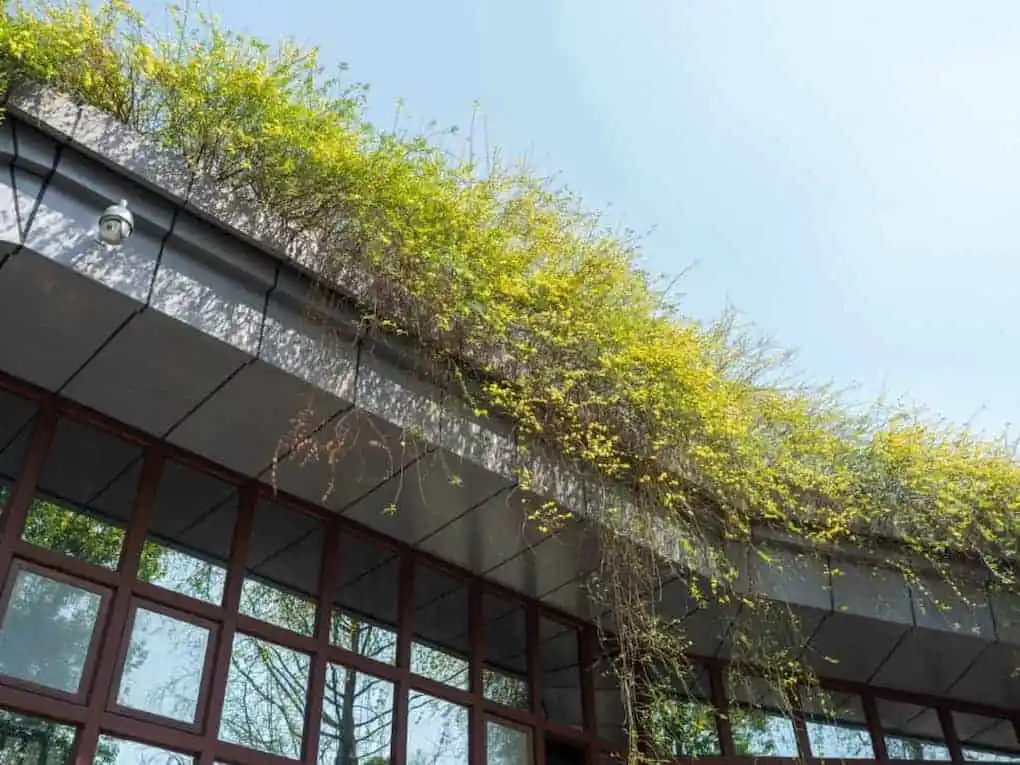
If you’re looking for a tough, waterproof roof with an impressive lifespan of 30 to 50 years, look no further than a sustainable green roofing system. Property owners can benefit from improved air quality, protection from the elements, potential government incentives, and a sophisticated water and drainage system.
One thing to consider is that vegetative roofs require more maintenance than some other commercial roofs. Businesses that want to provide additional green space for employees to relax can take advantage of these “green” roofs.
3. THERMOPLASTIC PVC ROOFS
Many environmental conditions could impact a commercial roofing system, such as bacterial growth, UV light, and fatty or oily chemicals. This is why many industrial roofs can benefit from using Thermoplastic Poly Vinyl Chloride (PVC) roofing systems because they are puncture-resistant, slow to damage, lightweight, and heat-reflective.
The last thing a business needs to worry about is whether or not their roof installation can hold up against the elements, so using high-quality PVC roofs is a great way to protect your investment against high temperatures and winds and its fire-resistance capabilities.
When looking for a trustworthy roofing contractor, make sure to inquire about the quality of the PVC roofs to ensure they are gathered from a reputable manufacturer.
4. SHINGLES
Shingles are one of the most popular roofing materials used by most residential pitched roofs. With ease, property owners can choose from numerous styles, colors, and material types (asphalt shingles, ceramic, slate, etc.). Now, while the lifespan of these roofs can vary based on the material used, shingles are relatively affordable, easy to install, and durable against harsh weather.
5. BUILT-UP ROOFING SYSTEM
This relatively inexpensive and easy-to-repair roofing system has a lifespan of up to 20 years or more, depending on the number of tar and gravel layers applied. Not only is built-up roofing (BUR) one of the most flexible roof types, but it is also UV-resistant and can be coated to reflect heat. If you need a roof system that can hold up well-to-foot traffic, BUR is an affordable and hardy option.
Now, to help maintain the roof’s integrity, it’s best to apply multiple layers. If properly installed, a commercial built-up roofing system can last around 40 years with minimal upkeep needed.
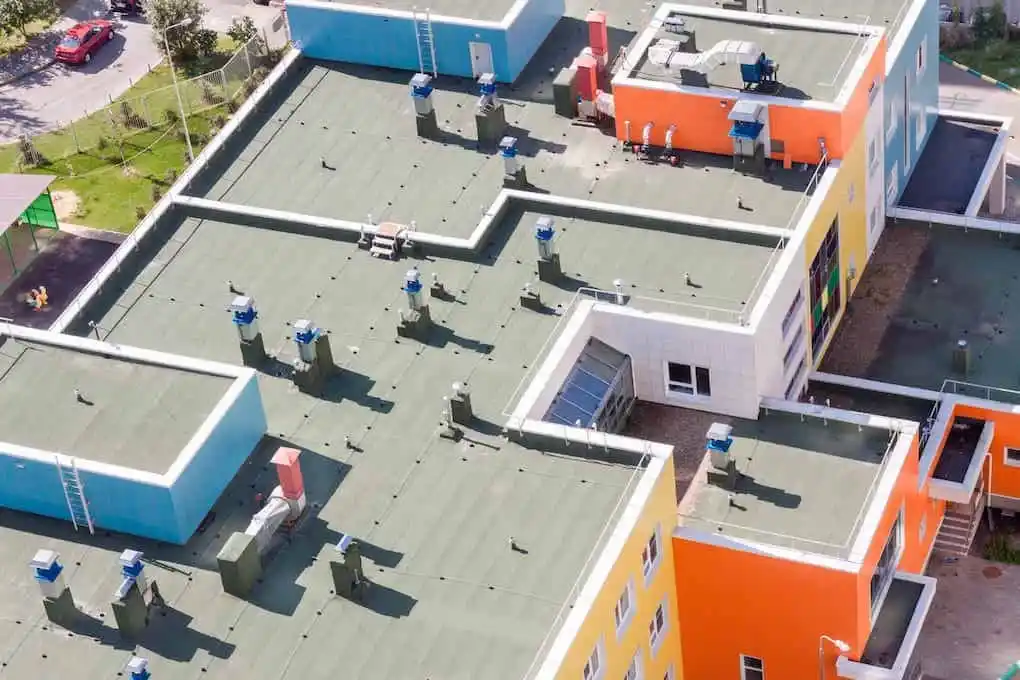
6. SINGLE-PLY MEMBRANE ROOFING
Single-ply membranes are rubber or other synthetic sheets that are chemically adhered to insulation on some commercial facilities. There are two main types of single-ply membrane roofing: Ethylene Propylene Diene Terpolymer (EPDM) and Thermoplastic Polyolefin (TPO). The main difference between the two materials is how they adhere to the membrane seams. EPDM roofs utilize seam tape while TPO melts down the seams to fuse them together along with the roof deck.
EPDM and TPO are very durable synthetic rubber roofing materials. These roll-based roof systems are quite versatile, fire-resistant, easy to install, and strongly resistant to pollution and UV light. With a Class A fire rating, both membranes are ideal for a commercial flat roof. EPDM and TPO membranes would also work well on low-sloped roofs. Building owners can pick between white or black single-ply membrane roofing styles for flat roofs.
One thing to note is that EPDM is susceptible to puncturing from falling debris or people walking on the roof. For this reason, it’s best not to choose this option for any facilities that are under trees or in areas that experience extreme storms with hail.
7. MODIFIED BITUMEN ROOFING SYSTEM
Property owners who want the look of an asphalt-based roof that works for low-slope and flat roofs can benefit from modified bitumen (MB) roofs. Over the last 50 years, this durable and sleek material has paved the way to be one of the best choices for commercial roofing systems. A modified bitumen roof is the evolutionary cousin of built-up roofing systems and is made from asphalt and polymerized plastic or rubber that is then reinforced with fiberglass.
Commercial low sloped roofs can utilize this tough yet flexible waterproof membrane. This material is also easy to maintain, energy-efficient, has outstanding tensile strength, and is tear-resistant to debris, weathering, and foot traffic.
ENERGY EFFICIENT UPGRADES FOR ANY PROPERTY
Many of these roof systems offer business owners durable, affordable, and additional energy incentives. Metal roofs can help reduce energy costs when applied to low slope roofs or pitched roofs. Owners who utilize this style could benefit from tax incentives, especially if paired with solar panels.
How often you need to make repairs or replacements on your roof systems can factor into its overall environmental impact and cost. Even though it has a higher initial price point, a metal roof can last up to 50 years, but it isn’t best for commercial flat roofs. Instead, a popular commercial roof type for a low slope roof system or a flat roof would be PVC, Modified Bitumen, or an EPDM roofing membrane.
These roof membranes are not as easily affected by ultraviolet light or the elements. Plus, an EPDM roofing material could cover an entire roof for a fraction of the price of other styles.
UPGRADE YOUR COMMERCIAL ROOFING SYSTEM
Whether you choose metal roofs, EPDM roofing, asphalt shingles, or any other single-ply rubber material to cover your commercial buildings, working with highly skilled roofing contractors is imperative. At MARS Roofing, we are an experienced local team that strives to protect you and your commercial properties from the elements with our exceptional commercial roofing services.
Our trusted technicians can help you select from different flat roof types, offer energy efficiency options, implement vital ventilation systems, and even assist in maintaining your roof’s integrity throughout the years.
Don’t wait to get started on your commercial roofing project. Call us today at to set up your free inspection.



